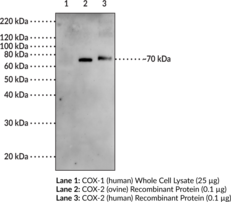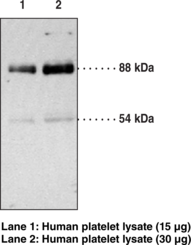Description
ApoA1 is a major protein component in high-density lipoproteins (HDLs). It acts as an acceptor for sequential transfers of phospholipids and free cholesterol from peripheral tissues and transports cholesterol to the liver and other tissues for excretion and steroidogenesis.{14038} Serum ApoA1 levels are inversely related to the risk of developing atherosclerosis.{14039} Loss-of-function mutations are causes of diseases such as HDL deficiency type 1 (or Tangier disease) and type 2 (familial hypoalphalipoproteinemia), and systemic non-neuropathic amyloidosis.{14037,14040} Liver and small intestine are two main sources of the protein. ApoA1 is comprised of a single polypeptide chain of 243 amino acid residues with an estimated molecular weight of 28 kDa. Cayman’s ApoA1 Monoclonal Antibody detects the protein from diluted human plasma (≤10 µg total protein) by western blotting. Western blotting of recombinant ApoA1 samples suggest a detection limit of 5 ng.
Synonyms: Apolipoprotein A1
Immunogen: Synthetic peptide from the internal region of human ApoA1
Formulation: Affinity-purified polyclonal antibody
Isotype: IgG1
Applications: WB
Origin: Animal/Mouse
Stability: 730 days
Application|Western Blot||Product Type|Antibodies|Monoclonal Antibodies||Research Area|Cardiovascular System|Cardiovascular Diseases|Atherosclerosis||Research Area|Cardiovascular System|Lipids & Lipoproteins|Lipoproteins||Research Area|Cardiovascular System|Lipids & Lipoproteins|Storage & Transport||Research Area|Endocrinology & Metabolism|Inborn Errors of Metabolism


